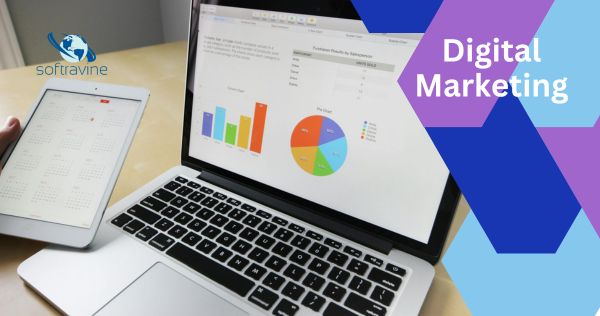Digital Marketing: The Key to Modern Business Success
In today's digital age, businesses are no longer confined by geographical boundaries. With the internet as a platform, reaching a global audience has become more accessible than ever before. Digital marketing is at the heart of this transformation, enabling businesses to connect with potential customers, build brand awareness, and drive sales through online channels.
What is Digital Marketing?
Digital marketing encompasses all marketing efforts that use an electronic device or the internet. Businesses leverage digital channels such as search engines, social media, email, and other websites to connect with current and prospective customers. Unlike traditional marketing, which often relies on physical mediums like print, television, and radio, digital marketing offers a more interactive and measurable approach.
The Core Components of Digital Marketing
Search Engine Optimization (SEO): SEO is the practice of optimizing your website to rank higher in search engine results pages (SERPs), thereby increasing organic (non-paid) traffic to your site. This involves both on-page SEO, such as optimizing content and meta tags, and off-page SEO, which includes backlink building and social sharing.
Content Marketing: Content marketing is the creation and distribution of valuable, relevant, and consistent content to attract and engage a clearly defined audience. Whether it's blog posts, videos, infographics, or eBooks, the goal is to provide content that solves problems and builds trust with your audience.
Social Media Marketing: Social media platforms like Facebook, Instagram, Twitter, and LinkedIn provide powerful tools for reaching and engaging with audiences. Social media marketing involves creating and sharing content on social media networks to achieve your marketing and branding goals. It also includes paid social media advertising, which allows for more targeted outreach.
Pay-Per-Click Advertising (PPC): PPC is an internet advertising model used to drive traffic to websites, where advertisers pay the publisher (typically a website owner or a network of websites) when the ad is clicked. Google Ads is one of the most popular forms of PPC, but it can also include social media ads and other types of online ads.
Email Marketing: Email marketing remains one of the most effective forms of digital marketing. By sending personalized emails to your target audience, you can nurture leads, promote products or services, and keep your audience engaged with your brand.
Affiliate Marketing: This performance-based marketing strategy involves earning a commission by promoting another company's products or services. Affiliates place ads or market the products on their website, app, or blog, and they get a commission when someone makes a purchase through their referral link.
Influencer Marketing: Influencer marketing leverages individuals who have a significant following on social media or other online platforms to promote products or services. These influencers can drive traffic and sales due to their credibility and relationship with their audience.
Web Analytics: Analytics tools like Google Analytics allow businesses to track the effectiveness of their digital marketing campaigns. Understanding how users interact with your website, where they come from, and what actions they take is crucial for refining and optimizing marketing strategies.
Why Digital Marketing is Crucial for Businesses
Cost-Effectiveness: Digital marketing is often more affordable than traditional marketing. Many digital marketing strategies, such as SEO or content marketing, require time rather than a significant financial investment. Even paid strategies like PPC and social media ads can be scaled to fit any budget.
Measurable Results: Unlike traditional marketing methods, digital marketing offers the ability to measure results accurately. With tools like Google Analytics, you can track the ROI of your campaigns, understand customer behavior, and make data-driven decisions.
Targeted Marketing: Digital marketing allows businesses to target specific demographics, interests, and behaviors. Whether through social media ads or PPC campaigns, you can reach the audience most likely to be interested in your products or services.
Global Reach: With digital marketing, even small businesses can reach an international audience. Online channels eliminate geographical limitations, allowing you to market to customers around the world.
Improved Conversion Rates: With the ability to track and optimize campaigns in real-time, digital marketing often leads to higher conversion rates. Whether it's through a targeted email campaign or a well-crafted landing page, digital strategies are designed to convert visitors into customers.
Future Trends in Digital Marketing
As technology continues to evolve, so too does digital marketing. Here are a few trends that are shaping the future of the industry:
Artificial Intelligence (AI): AI is playing an increasingly important role in digital marketing, from chatbots providing customer service to AI-driven content creation and personalization.
Video Marketing: Video continues to dominate the digital landscape, with platforms like YouTube, TikTok, and Instagram Reels leading the way. Businesses are increasingly using video content to engage audiences and drive conversions.
Voice Search Optimization: With the rise of smart speakers and voice assistants like Siri and Alexa, optimizing for voice search is becoming a crucial part of SEO strategies.
Personalization: Consumers are expecting more personalized experiences, whether through tailored email campaigns, product recommendations, or customized content. Data-driven marketing is enabling businesses to deliver these personalized experiences.
Sustainability and Ethical Marketing: Consumers are increasingly concerned about the ethical practices and sustainability efforts of the brands they support. Digital marketing strategies that focus on transparency, social responsibility, and eco-friendly practices are gaining traction.
Conclusion
Digital marketing is no longer optional; it's a necessity for businesses looking to thrive in the modern marketplace. By leveraging the right mix of strategies, from SEO and content marketing to social media and PPC, businesses can reach their target audience, build lasting relationships, and drive long-term success. As the digital landscape continues to evolve, staying ahead of the trends and adapting your strategies will be key to maintaining a competitive edge.


Comments (0)